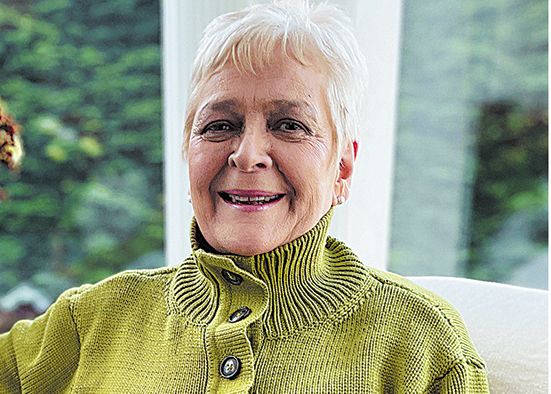Etain on significance of check-ups after cancer diagnosis
Etain on significance of check-ups after cancer diagnosis
4 December 2024

A DOWNPATRICK woman who survived mouth cancer is encouraging people to have regular dental check-ups.
Etain Fitzpatrick was diagnosed with oral cancer in September 2022 after noticing that a persistent mouth ulcer had not healed for several weeks.
She said her cancer journey highlights the critical role dental check-ups play in the early detection of oral health issues so they can be treated as soon as possible.
Etain – who is passionate about raising awareness of oral cancer – attended a routine dental examination in early 2021 when her dentist initially noticed some white spots under her tongue. She was subsequently referred to the Ulster Hospital to have these investigated and a biopsy was performed.
The results came back clear with “nothing of a concerning nature”, with the Downpatrick woman advised to keep a close check for any further changes.
In August the following year, Etain noticed that an ulcer had started to form on the side of her tongue, which was uncomfortable and painful at times.
“I was using an over-the-counter gel and ended up going to the chemist to see if I could get something a little bit stronger as the ulcer was so painful as it was catching on my teeth,” she explained.
“The pharmacist recommended that I go back to my dentist who, following examination, referred me as a red-flag patient to the Ulster Hospital. Within five weeks, I had an appointment and a biopsy of the ulcer undertaken.
“During the five-week wait, the ulcer got really aggressive and painful to the extent that I could hardly eat and started to lose weight, only able to eat yogurts and soft fruit.”
Following the biopsy, Etain had a gut feeling that it wasn’t going to be good news.
“I was told that cancer had been detected and very swiftly was admitted to the Ulster and underwent surgery to remove the cancer from my tongue,” she continued.
“I was in surgery for approximately 10 hours and had 25% of my tongue removed. It was rebuilt using various grafts from my thigh and arm and I spent around 10 days in hospital recovering.
“The surgery was extensive and everything was explained to me beforehand, including how my speech could be severely impacted and that I could have problems moving my neck.”
Etain’s recovery went well and when discharged from hospital it was waiting for the pathology report that she found to be an extremely anxious time.
She recalled that when the consultant contacted her to tell her she was now cancer-free, she was in tears couldn’t believe it.
“The consultant said I had a good margin and no further treatment such as radiotherapy or chemotherapy was required,” she said.
“Around 50% of oral cancer patients, who have had the same type of surgery as myself, require some form of additional treatment, so somebody was definitely looking down on me. I feel blessed that I did not require any further treatment.”
Given her journey, Etain’s advice is to never ignore dental appointments, revealing she never thought her dentist would be the first port of call for oral cancer.
“I never miss a dental appointment and it was my dentist who identified the cancer. It was never a cancer that crossed my mind. I had breast cancer 18 years ago, so raising awareness is so important to me.”
Now on the road to recovery, keen mountain walker Etain says that physical exercise has helped her both mentally and physically.
“The morning after my operation, two physiotherapists came to get me up and out of bed,” she revealed. “I was up and about making tracks on the corridors of the ward. I wanted to be active and get out of hospital getting back to doing the things I love.
“A big part of my life is physical activity such as climbing mountains, given where I live in beautiful surroundings with parks. Physical activity definitely helped me on my road to recovery both mentally and physically.”
Now back to her normal self, Etain is doing all the things she had been doing before she became ill and when it comes to eating, she revealed she can tackle anything now, from curries to steaks.
“Life is back to normal for me,” she said.
Reflecting on her cancer journey, Etain said she cannot thank the oral and maxillo-facial team at the Ulster Hospital enough.
“They are my heroes and my angels. From the consultants, nurses, clinic staff and those on the ward, they are simply amazing. What a team.”
Highlighting the signs and symptoms of oral cancer, oral and maxillo-facial consultant surgeon, Mr John Hanratty, said mouth cancer can present in different ways.
“It could be an ulcer that has been present for more than three weeks, a white or red patch in the mouth that is giving symptoms of pain, or a lump or swelling in the mouth, oral cavity or neck area. So we would ask that if you have any of these you should be checked by a dentist or GP,” he said.
“Evidence also shows that oral cancer is more prevalent with social deprivation, poor diet, increased alcohol consumption and smoking which are all increased risk factors.
“We know that early detection and treatment can lead to better outcomes for the patient but, unfortunately, only 20% of people will present with an early stage cancer.”
Mr Hanratty said about 45% of people will present with a cancer that is large or has spread elsewhere and this gives the cancer a greater stage and poorer outcome for patients.
He added: “We would ask that if you have a problem please don’t be afraid to let your doctor or dentist know.”


